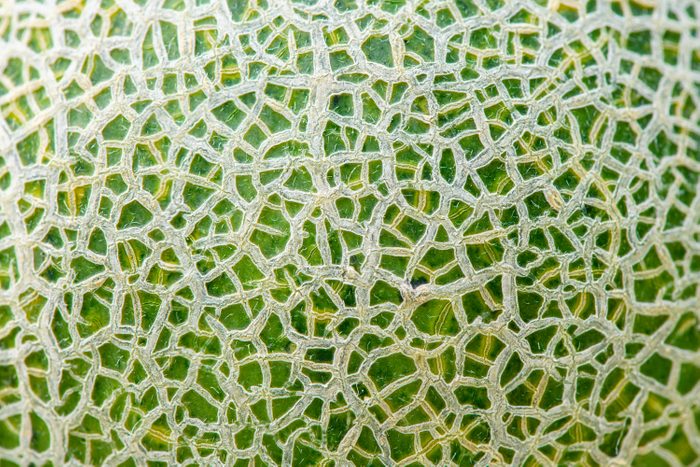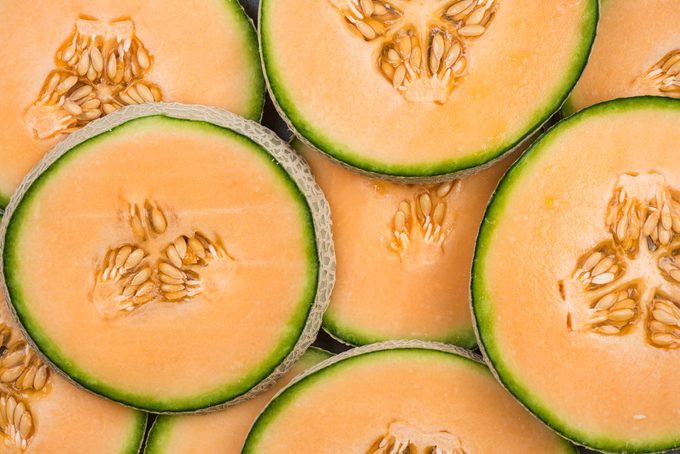A Popular Fruit Was Just Recalled in 19 States Due to Salmonella Concerns
Updated: Dec. 01, 2023

It's popular on a breakfast plate and paired with prosciutto, but a specific brand of this melon is being removed from Walmart and other grocers.
Fresh melons are an affordable, healthy breakfast food for many. But, if you’re a fan of slicing up the orangey-peach cantaloupe, you’re going to want to check your kitchen for a specific brand that just got recalled in 19 states and Washington, D.C.
On September 28, the FDA announced that Eagle Produce LLC, situated in Scottsdale, AZ, had voluntarily recalled nearly 6,500 cases of whole cantaloupe due to potential Salmonella contamination. This contamination was discovered during routine testing at a distribution center.

The recalled cantaloupes were sold between September 5, 2023 and September 16, 2023 in various locations in California, Illinois, Indiana, Iowa, Kentucky, Louisiana, Maryland, Michigan, Minnesota, Missouri, North Carolina, North Dakota, Ohio, South Dakota, Tennessee, Texas, Virginia, West Virginia, Wisconsin and Washington D.C . They are labeled under the brand name “Kandy” and all have the UPC 4050, with lot codes 797901, 797900 and 804918.
While the alert mentions “various retail supermarkets,” it doesn’t provide a specific list of grocers that sell Kandy cantaloupes. Walmart has published a list of stores on its website that may have sold the recalled cantaloupe. If you reside in one of these states and have recently purchased cantaloupe, it’s advisable to check your produce. The good news is that, as of September 27, there have been no reported illnesses associated with these melons.
If you have purchased these recalled cantaloupes, authorities advise that you do not consume them and instead dispose of them safely. Contact the supermarket where you bought it for refund details. If you have any questions, you can reach out to Eagle Produce LLC at 1-800-627-8674; their hours of operation are Monday to Friday from 9 a.m. to 5 p.m. PST.
On November 29, Trader Joe’s announced a recall of the following products due to the potentially contaminated cantaloupe:
- Whole Cantaloupe (sku# 20669/PLU 4050)—branded as “Malichita” or “Rudy”—sold in northern CA and northern NV stores between 10/24/23 and 11/5/23
- Fresh Cut Cantaloupe Chunks (sku# 95266) and Fresh Cut Fruitful Medley (#54991) —SELL BY dates 11/1/23, 11/2/23, 11/7/23,and11/8/23—sold only in AL, FL, GA, SC, and TN stores
Trader Joe’s says any customers with questions should call Customer Relations at (626) 599-3817 during their hours of operation on Monday through Friday, between 6 a.m. to 6 p.m. PST.
Symptoms of Salmonella
Salmonella can be contracted from eating various foods undercooked or raw, including meat, poultry, eggs, dairy products, and fruits and vegetables, according to the FDA. It’s also possible to get sick from handling contaminated foods or animals and not thoroughly washing your hands afterward, potentially transferring the contamination to other foods. Symptoms can appear within a few hours to up to six days later, making it challenging to pinpoint the source of the illness.
While most individuals will experience mild to moderate symptoms such as diarrhea, nausea and stomach pain, those with weakened immune systems, such as pregnant women, children and the elderly, may face more severe consequences, including death.
Football Food Safety: 5 Tips for Your Next Tailgate, From a Microbiology Expert
Why you should always wash cantaloupes
It’s essential to wash all fruits and vegetables, including thick-skinned melons like cantaloupes, even though not everyone follows this practice. The rind, while it may protect the fruit inside, could be contaminated with pathogens on the outside, which can be introduced to the inside when you cut into it. Francisco Diez-Gonzalez, PhD, professor and director of the Center for Food Safety at the University of Georgia, recommends vigorously scrubbing cantaloupe. “Don’t just rinse your cantaloupe; scrub it down and wipe it dry before cutting it open,” Dr. Diez-Gonzalez advises.
However, this advice doesn’t apply to recalled fruits. The safest approach is to dispose of them. Cantaloupes have been associated with several recalls due to contamination, as they are rarely cooked before consumption and can harbor various pathogens. In 2011, one of the country’s deadliest foodborne outbreaks was linked to cantaloupes contaminated with Listeria monocytogenes, resulting in 33 deaths and over 147 illnesses.




















